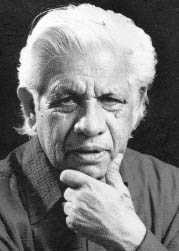Urdu fiction’s grand old man leaves a big void
IN the passing of Kashmiri Lal ‘Zakir,’ a recipient of Padma Shri, the Urdu-loving fraternity has lost a grand old man of fiction. As a witness to almost a century, he touched almost every problem of significance. Beginning his writing career in the 1940s with Alag Alag Raste, he remained in the literary saddle till the end. He gave us Katha Damini Ki and Tumhein To Koi Rone Wala hi Nahin and much more.
Alag Alag Raste brought the budding artist in him to the fore. It first appeared in Humaiyoon in October, 1943 (then edited by Miyan Bashir Ahmed). And his little classic, Woh Subha Zinda Rahe Gi, is a kind of travelogue, based exclusively on Zakir’s goodwill visit to Pakistan. Zakir remained free from any signs of exhaustion. With the possible exception of Quarratulain Hyder, another contemporary novelist of exceptional merit, Zakir is perhaps the only novelist who worked with tirelessness and perfection through his 60-year literary career. Rajinder Singh Bedi gave us Ek Chadar Meli Si, Krishan Chander Jab Khet Jage, Khwaja Ahmed Abbas Inqalab and Rama Nand Sagar Aur Insan Mar Gaya. But Zakir came out with novel after novel in a quick succession: Angoothe Ka Nishan (1978), Dharti Sada Suhagan (1980), Karman Wali (1980), Teen Chehre Ek Sawal (1981), Lamhon Mein Bikhri Zindagi (1982), Doobte Suraj Ki Katha (1985) and Mera Shahr Adhoora Sa (1991).
A novelist who wants to be seriously involved in his art requires, in Zakir’s own words, “at least six hours a day.” In India, creative writing has failed to grow into a full-fledged profession. Those who try to live by pen alone are generally left to starve.
Born on April 7, 1919 at Kunjah in district Gujrat (now in Pakistan) where his father owned plenty of land. In college, Zakir represented the nationalist movement of the time and was, as such, mostly at war with people like Triloki Nath (principal of DAV College, Chandigarh), who had a different philosophy. Zakir was hardly 20 when he came in contact with Upendra Nath Ashk, a noted Urdu writer. Young Zakir enthusiastically requested Ashk to take a look at his work. Ashk wanted to test Zakir’s patience. So, he asked him to revise his works. Zakir revised and revised. At last, in a fit of excitement, he threw them all into fire!
The 1947 riots left an indelible impression on him. Zakir came up with Karman Wali (1980). In those days of horror and blood-bath, Zakir had his well-wishers to support him. He got his Master’s in English in 1954 and, encouraged by well-wishers, Zakir joined Education Department as Circle Social Education Officer.
The themes that Zakir sought to project are based mostly on his practical experiences as they can easily be disengaged from the chain of events that bring them out.
(The writer is founder head (retd), Post-Graduate Department of English, SD (PG) College, Panipat)










